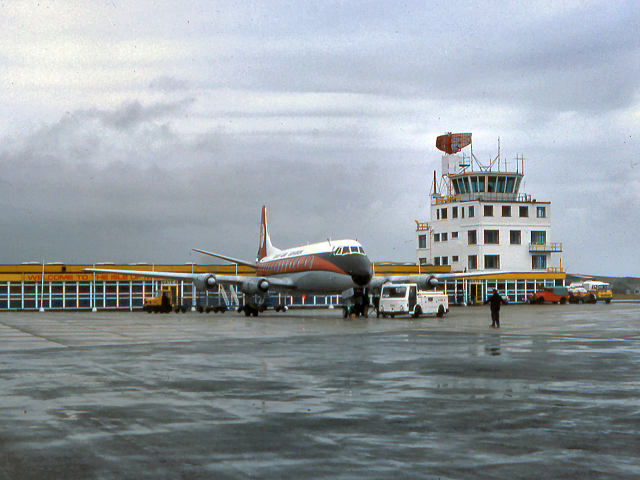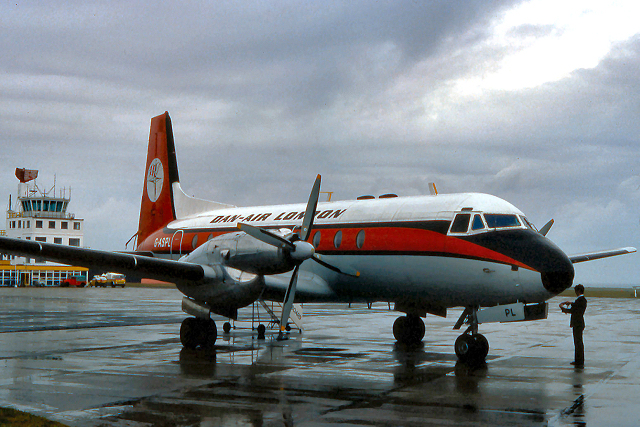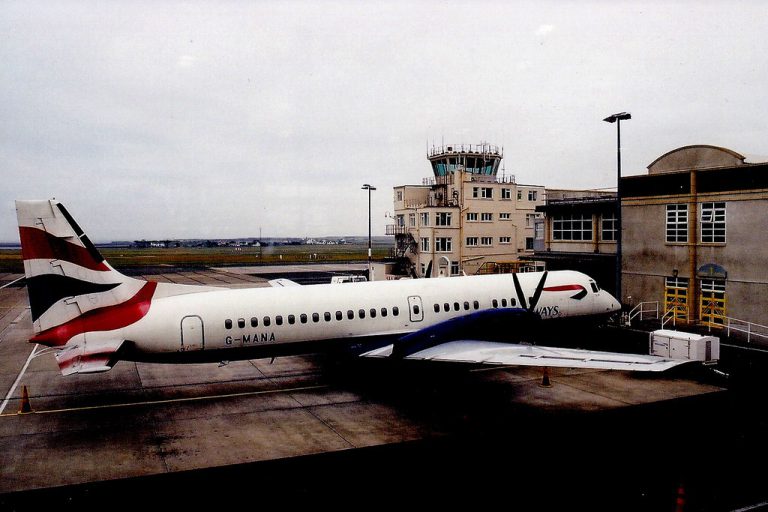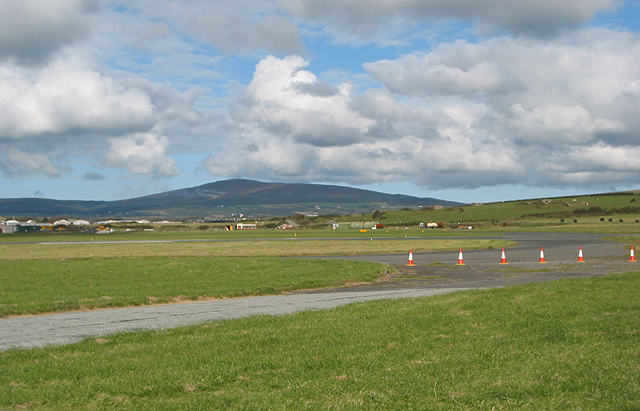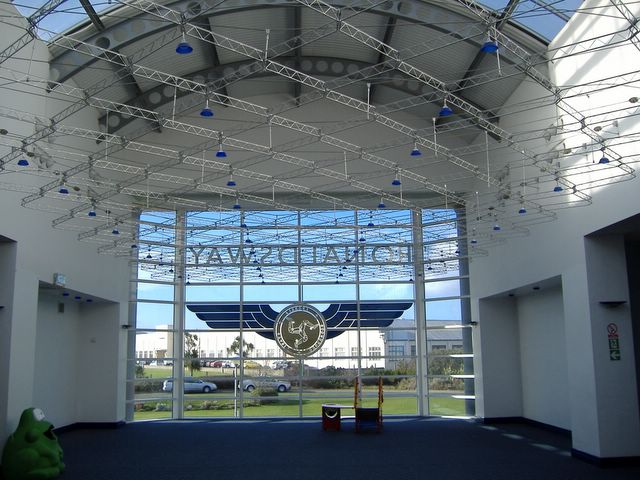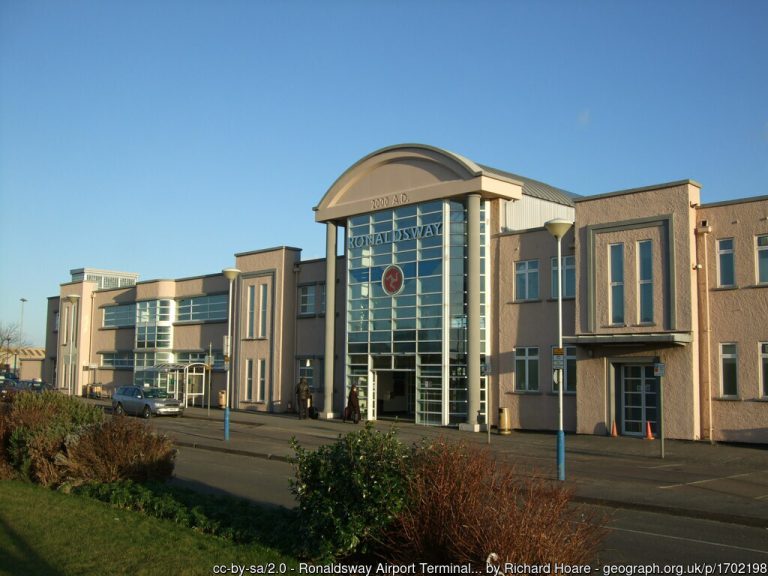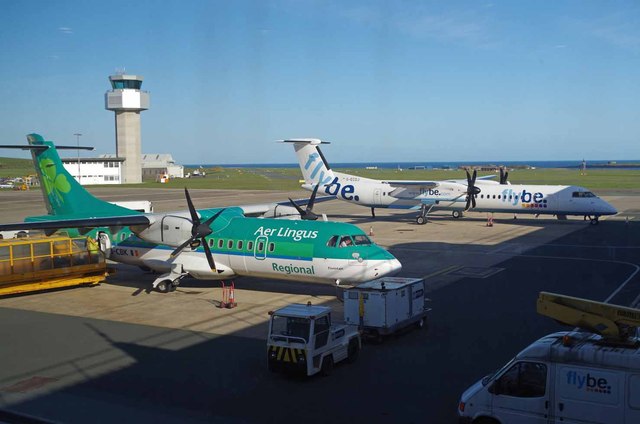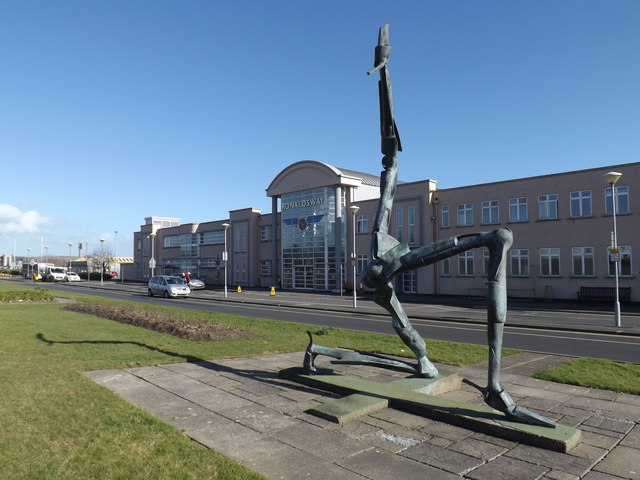Airfield search
Ronaldsway (Isle of Man)

“
Today’s Isle of Man Airport beat off competition for the title from Hall Caine in the 1930s, despite this other airfield looking after passengers well and Ronaldsway handling them – as one person described – ‘that one is treated like a railway passenger.’
“| Also known as: | Ballasalla (unofficial local name) / HMS Urley / Isle of Man Airport / RAF Station, Ronaldsway / RN Air Station, Ronaldsway / RNAS Ronaldsway / Ronaldsway Aerodrome / Ronaldsway Airport |
| County: | Isle of Man |
| Current Status: | Aviation / Museum |
| Date: | Opened 1930s |
| Current Use: | Active |
| Used By: | RAF / FAA / Civil |
| Landing Surface Type(s): | Unpaved, later paved (1944) |
What has almost from the beginning remained as the most famous airfield in the Isle of Man has managed to keep going despite various factors which have tried hard to conspire against it. The precise start of flying at Ronaldsway is none too clear but certainly by 1933 the airfield was fully up and running for various airline services to a number of different parts of the British mainland, while being listed as an Automobile Association civil landing ground helped too. Although a small and not tremendously good landing area and especially fog did not help matters, the airfield had one major advantage in being on the ‘right’ side of the island in terms of being near the main town of Douglas, a factor which played its part in the downfall of its 1930s competitor Hall Caine and then, much later on, Jurby.
World War Two saw Ronaldsway being requisitioned by the RAF in June 1940 to allow No 1 Ground Defence Gunners School to move in. The grass landing area was somewhat enlarged but for the first half of the conflict target-towing aircraft remained mainly restricted to obsolete biplane types including Gloster Gauntlets, Hawker Harts and Westland Wallaces. Later known as No 3 RAF Regiment School, this unit lasted until February 1943 when it transferred to Hutton Cranswick in Yorkshire.
This departure was most important as it allowed the Admiralty to move in to Ronaldsway, duly massively transforming the place with hard runways and many hangars among other infrastructure items to create what is still today readily evident. HMS Urley came into being on 21 June 1944 and had as its main task torpedo bomber reconnaissance and associated training as several FAA squadrons, mainly operating Fairey Barracudas, stayed until three of them disbanded in December 1945 with their base being paid off on 14 January 1946.
Ronaldsway’s naval career may have been brief but the civil flying commitment always remained, one of the relatively few transport services left in Britain during World War Two, and the airfield eventually became main airport for the island in 1948. Traffic noticeably picked up during the 1950s as air travel began beating ships for profitability from Liverpool and since then the airport has kept steadily busy to accommodate numerous airlines and general aviation concerns. The naval four runway layout survives in place, allowing for inevitable extensions; although a typical four storey control tower from that period has now vanished, one surprising survivor is the hangar from Hall Caine which came to Ronaldsway after two moves from the north of the island. Many historical relics relating to the Isle of Man’s airfield history can also be found at the excellent Manx Aviation and Military Museum close by. Fog may still linger from time to time but Ronaldsway is definitely one of the great airfield survivors, and doing a very good job in the process.
Main unit(s) present:
- No 1 Ground Defence Gunners School
- No 3 RAF Regiment School
-
No 705 Sqn
-
No 710 Sqn
-
No 713 Sqn
-
No 725 Sqn
-
No 747 Sqn
-
No 776 Sqn
-
No 822 Sqn
-
No 836A Flight
-
No 836U Flight
-
No 845 Sqn
- No 2796 Sqn RAF Regiment
-
Aer Lingus Regional
-
Air Charter and Travel
-
Air UK
-
Airde
-
Atlantic Airlines
-
Autair
-
BA Connect
-
BEA
-
BKS Aero Charter
-
Blue Islands
-
British Airways
-
British Amphibious Airlines
-
British Island Airways
-
British NorthWest Airlines
-
British United Island Airways
-
Dan-Air
-
Derby Airways
-
Don Everall (Aviation)
-
Eastern Airways
-
EuroManx
-
easyJet
-
Flybe
-
Isle of Man Air Services
-
Isle of Man Flying Club
-
Knight Air
-
Lancashire Aircraft Corporation
-
Manx2
-
Manx Air Charters
-
Manx Airlines
-
Morton Air Services
-
Northern and Scottish Airways
-
Railway Air Services
-
SATA International
-
Scottish Airlines
-
Silver City Airways
-
Sivewright Airways
-
Thomas Cook Airlines
- Woodgate Aviation
A Dan-Air Hawker Siddeley HS-748 at Ronaldsway, 28 July 1979. © David Dixon and licensed for reuse under this Creative Commons Licence
A Dan-Air Hawker Siddeley HS-748 at Ronaldsway, 28 July 1979. © David Dixon and licensed for reuse under this Creative Commons Licence
Ronaldsway, 14 September 2003. © Joseph Mischyshyn and licensed for reuse under this Creative Commons Licence
Ronaldsway, October 2004. © Pauline E and licensed for reuse under this Creative Commons Licence
View from inside the terminal building at Ronaldsway, 1 March 2007. © kevin rothwell and licensed for reuse under this Creative Commons Licence
The terminal building at Ronaldsway, 10 February 2010.
The flight line at Ronaldsway, 14 April 2014. © Glyn Baker and licensed for reuse under this Creative Commons Licence
Footage of Ronaldsway, probably 1938. Courtesy of manxfilm
Includes footage of the airport, 1959. Courtesy of British Pathé
Runway work being carried out at Ronaldsway, c. 2014. Courtesy of Colas Limited
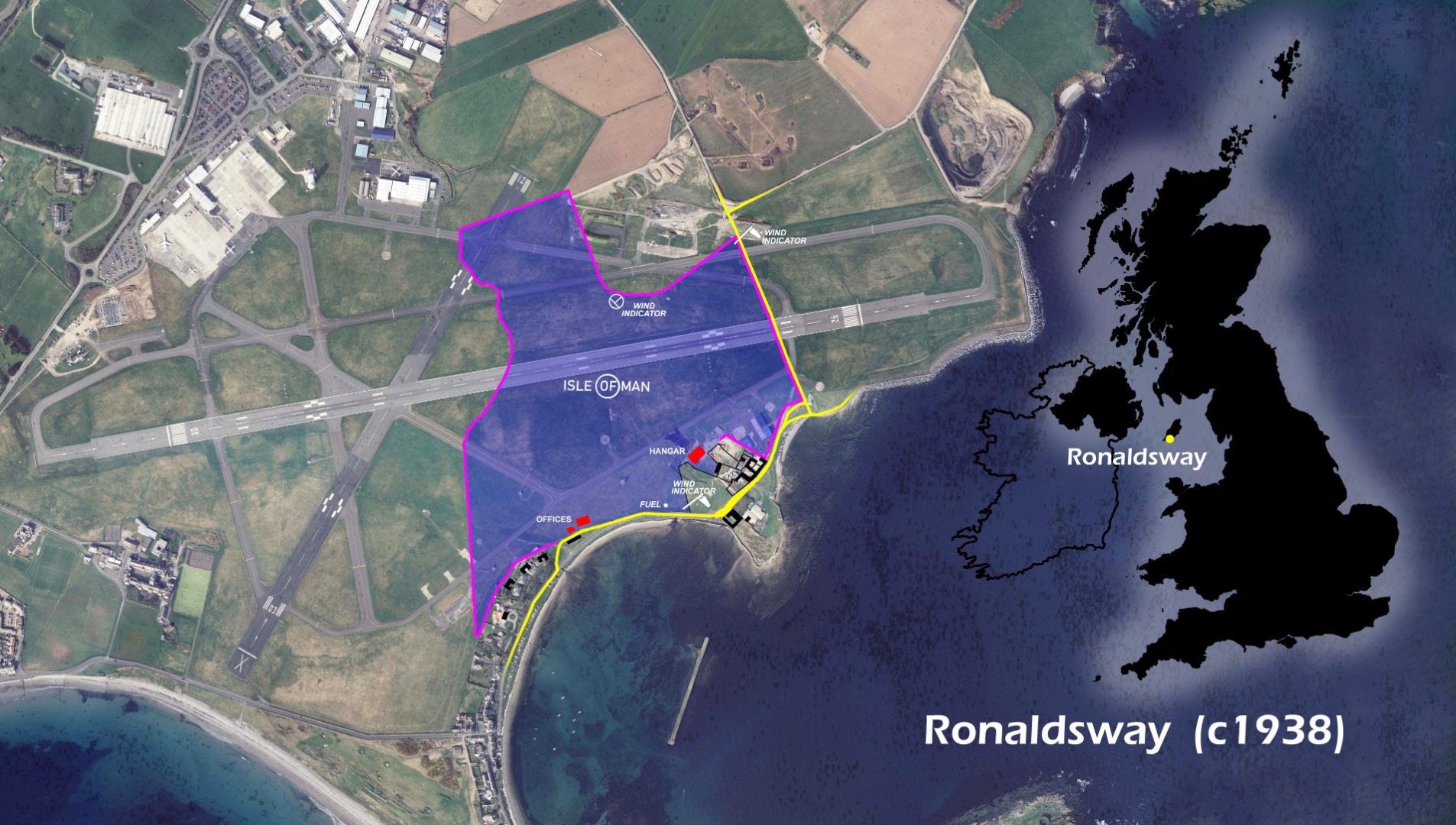
Plan of Ronaldsway, 1938. Courtesy of Ed Andrews
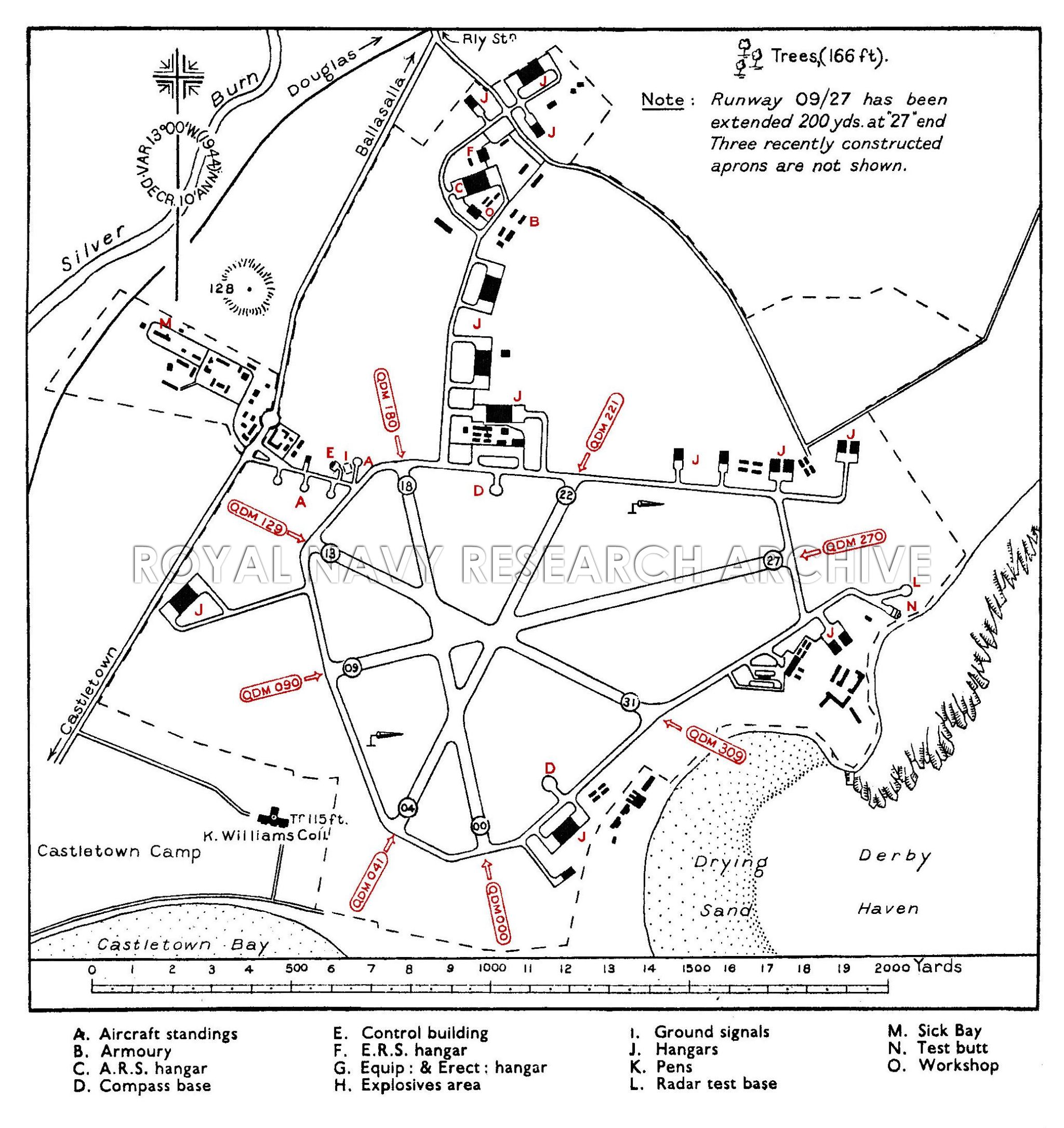
Plan of Ronaldsway, c. 1940s. © Royal Navy Research Archive. Click here for more information.

